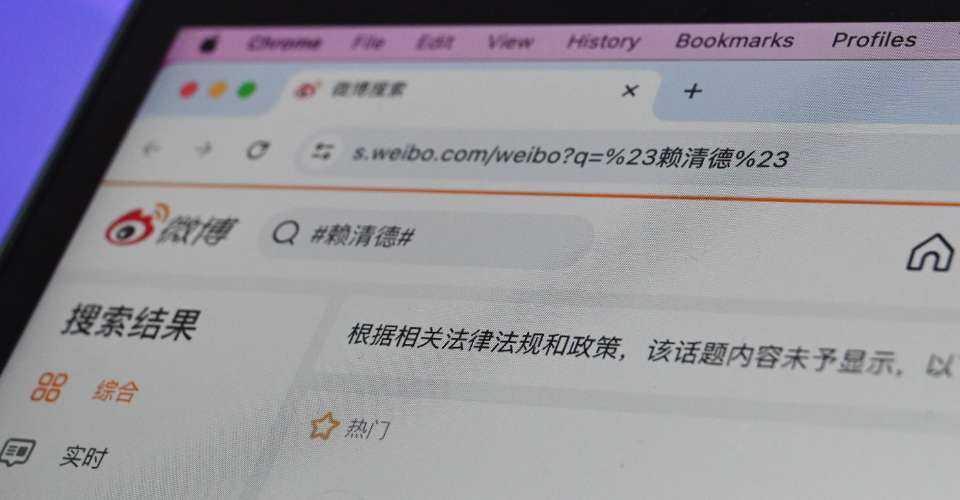
This photo illustration shows a screen with a Weibo search for the name of Taiwan's new President Lai Ching-te, and a message saying 'According to relevant laws, regulations, and policies, the content of this topic has not been displayed,' in Beijing on May 20. (Photo: AFP)
Academics and activists have expressed concern over the rapidly diminishing access to online information in China, particularly about the country's recent history, and blamed the country’s strict censorship laws.
China’s Chongqing City-based scholar identifying only as Wang alleged that a part of the reason archived content is quickly disappearing is the tightening of government censorship in recent years, Radio Free Asia (RFA) reported on May 24.
"Articles from more than 10 years ago are likely to get someone into trouble today," Wang said.
"A lot of Chinese media act under the leadership of the [ruling Chinese Communist] Party, so it's inevitable that they will delete stuff,” Wang added.
Reportedly, an internet archive run by researchers at Peking University that allowed users to perform keyword searches of more than 2.5 billion historical web pages from millions of websites in Chinese is non-functional.
The site had described itself as a permanent "public service" that would help users "understand how major historical events unfolded."
RFA reported that a test conducted by its Taiwan and Europe team showed that the site had failed to load on May 23.
A Guizhou-based scholar identifying only by his surname Zhang for fear of reprisals said that some of the online content on many of China’s websites has been deleted on strict government orders.
“The State Education Commission issued a notice to the whole country, which meant that no critical articles could appear on the internet,” Zhang said.
“It [the notice] said that university online forums weren’t outside the law, so all posts should be deleted, and all comment functions shut down,” she said.
The university campuses are regarded by the Chinese Communist Party (CCP) as “an important battlefield that had to promote the main theme [of government propaganda],” Zhang said.
Chinese authorities have been consistently censoring content related to politically charged events like the June 4, 1989, Tiananmen massacre from schools, university textbooks, public spaces, and online platforms.
Researchers allege that even less sensitive materials are also fast disappearing from online platforms which makes it harder to form a picture of China’s history just a couple of decades ago, before President Xi Jinping took power, RFA reported.
A recent blog post reposted on several Chinese platforms titled, "The collapse of the Chinese internet is accelerating," by He Jiayan alleged that the collapse of the Chinese internet was accelerating.
Jiayan detailed the attempt to find news stories about Alibaba founder Jack Ma dating from May 22, 1998, to May 22, 2005, on Chinese news platform Baidu which returned only one article from 2021.
The only available article was about the early years of Alibaba's rise from an e-commerce upstart to a global technology conglomerate.
"In other words, if we want to understand Jack Ma's experiences, reports, people's discussions about him, his speeches, the company's development history, etc. during that period, the amount of effective original information we can get is zero," Jiayan said.
Jiayan pointed out that "after the rise of mobile internet, Chinese content on the traditional internet has all but disappeared," adding that Chinese-language search results via Google and Bing also yielded scanty results.
"We once thought the internet would remember stuff -- we never expected its memory would be akin to that of a goldfish," Jiayan lamented.
Lu Jun, co-founder of the non-government Beijing Yirenping Center, which campaigned for human rights in healthcare, said he had noticed content disappearing from online platforms.
The disappearance of such websites and archived news materials will have a huge impact on Chinese people's access to their recent history, said Feng Chongyi, an associate professor of Chinese studies at the University of Technology Sydney.


